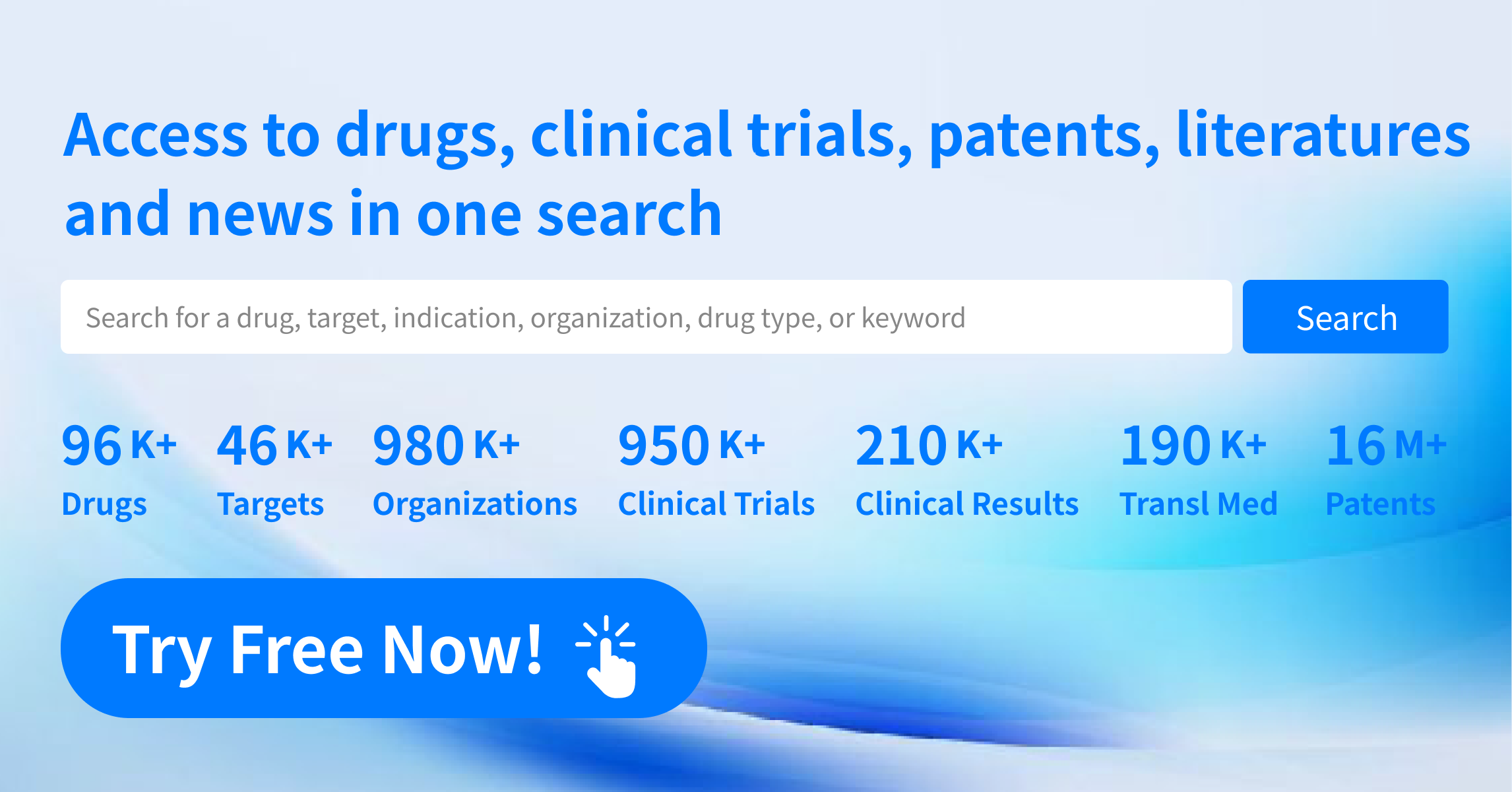Global New Drug Research and Development Progress Weekly Report (9.9-9.15)
What other drugs have been approved this week?
1. Johnson & Johnson: New Indication for Guselkumab Approved by FDA
On September 11, Johnson & Johnson announced that Guselkumab (brand name: Tremfya) received FDA approval for a new indication to treat moderate-to-severe active ulcerative colitis (UC) in adult patients. Guselkumab is an IL-23 inhibitor.
Guselkumab was first approved by the FDA in July 2017 for the treatment of moderate-to-severe plaque psoriasis in adults, making it the world's first anti-IL-23 monoclonal antibody approved for psoriasis treatment. Since then, it has expanded to other indications, with approvals in regions like the U.S. and Japan for conditions including palmoplantar pustulosis and psoriatic arthritis. Post-launch, its sales have steadily increased, reaching global sales of $3.146 billion in 2023.
This latest approval was based on results from the key Phase IIb/III QUASAR clinical trial, which showed that 50% of patients receiving 200 mg every 4 weeks and 45% of patients receiving 100 mg every 8 weeks achieved clinical remission at week 44, compared to 19% in the placebo group.
2. Eli Lilly: IL-13 Monoclonal Antibody Approved by FDA
On September 13, Eli Lilly announced that its IL-13 monoclonal antibody, Lebrikizumab (brand name: Ebglyss), was approved by the FDA for the treatment of moderate-to-severe atopic dermatitis in adults and children aged 12 and above.
This approval is primarily based on the results from the ADvocate 1, ADvocate 2, and ADhere studies, which evaluated the skin clearance of enrolled patients at week 16. The results showed that after 16 weeks of treatment, 38% of patients in the Ebglyss group achieved clear or almost clear skin (IGA 0 or 1), compared to 12% in the placebo group. Among those who achieved clear or almost clear skin, 77% maintained remission for up to one year with monthly dosing. On November 16, 2023, Lebrikizumab was also formally approved for marketing in the European Union.
3. Sanofi/Regeneron: New Dupilumab Indication Approved by FDA for Adolescents
On September 13, Regeneron announced that Dupilumab (brand name: Dupixent) received FDA approval for a new indication as an add-on maintenance therapy for adolescents aged 12 to 17 with inadequately controlled chronic rhinosinusitis with nasal polyps (CRSwNP).
This approval is primarily based on extrapolated efficacy data from two pivotal trials in adults with CRSwNP (SINUS-24 and SINUS-52), as well as safety data from other approved indications in adolescents.
Dupilumab, the world’s first IL-4R monoclonal antibody, was initially approved in March 2017, with first-year sales of $251 million. Since then, Dupixent has expanded to additional indications, including asthma and nasal polyps. Now a blockbuster drug, Dupixent achieved global sales of $11.589 billion in 2023, marking a year-over-year growth of approximately 33%. In the first half of 2024, with sales of $6.66 billion, it surpassed AbbVie’s adalimumab ($5.084 billion) and Johnson & Johnson’s ustekinumab ($5.336 billion), making it the new leader in the autoimmune therapeutic space.
4.Sanhome Pharmaceutical: Third-Generation EGFR-TKI Approved for First-Line NSCLC Indication
On September 9, the NMPA website announced that Sanhome Pharmaceutical’s Class 1 innovative drug, Oritinib Mesylate, has been approved for its second indication, as a first-line treatment for locally advanced or metastatic non-small cell lung cancer (NSCLC) with EGFR-sensitive mutations. In June of this year, the drug was also approved for second- and later-line treatment of adult patients with locally advanced or metastatic NSCLC harboring the EGFR T790M mutation who experienced disease progression during or after EGFR-TKI treatment. Additionally, a study (SHC013-III-02) investigating the use of Oritinib Mesylate as adjuvant therapy for post-operative stage II-IIIB NSCLC patients with EGFR mutations is currently ongoing.
In a randomized, double-blind, multi-center phase III clinical trial comparing Oritinib Mesylate to Gefitinib in the first-line treatment of patients with locally advanced or metastatic NSCLC with EGFR-sensitive mutations, the results showed that the median progression-free survival (PFS) assessed by the independent review committee (IRC) was 19.3 months for the Oritinib Mesylate group and 9.8 months for the Gefitinib group, marking an improvement of 9.5 months in median PFS with Oritinib Mesylate treatment compared to the standard treatment with Gefitinib. In terms of safety, most adverse events observed during the clinical trial were mild to moderate, with a low incidence of common side effects such as rash and hematologic toxicity.
5.Fosun Pharmaceutical: Daxxify, Approved for Facial Wrinkles in China
On September 9, the NMPA website showed that Fosun Pharmaceutical’s Type A botulinum toxin product, Daxxify, has been approved for the temporary improvement of moderate to severe glabellar lines caused by the activity of the corrugator and/or procerus muscles in adults.
Daxxify is developed based on Revance Therapeutics' proprietary TransMTs technology platform and is a next-generation neuromodulator containing a stabilizing peptide formulation and highly purified Type A botulinum toxin. It is the first and only long-acting peptide-based neuromodulator. In December 2018, Fosun Pharmaceutical entered into a collaboration and licensing agreement with Revance for the commercialization rights of Daxxify in mainland China, Hong Kong, and Macau, with a deal valued at $88 million.
On September 8, 2022, Revance Therapeutics announced that the U.S. FDA had approved Daxxify for the temporary improvement of moderate to severe glabellar lines in adults. Daxxify does not contain human serum albumin or animal-derived ingredients, and its wrinkle-reducing effects last for a median duration of six months, with the maximum duration reaching up to nine months. In terms of safety, no severe treatment-related adverse events were reported, and its safety profile is consistent with other neuromodulators currently available in the aesthetic medicine market.
6.Otsuka Holdings: Third-Generation Bcr-Abl Inhibitor Ponatinib Approved in China
On September 9, the NMPA website announced that Otsuka Holdings' submission for Ponatinib has been approved for the treatment of chronic myeloid leukemia (CML) and relapsed or refractory Philadelphia chromosome-positive acute lymphoblastic leukemia (Ph+ ALL) in patients who are resistant or intolerant to prior therapy, as well as for patients with T315I-positive CML or Ph+ ALL.
Ponatinib was initially developed by Ariad Pharmaceuticals as a third-generation Bcr-Abl tyrosine kinase inhibitor. In December 2014, Otsuka Holdings entered into a partnership with Ariad to co-develop and commercialize Ponatinib in Japan, China, South Korea, and other Asian countries. In early 2017, Takeda Pharmaceuticals acquired Ariad and gained ownership of the product.
7.UCB: New Indication for IL-17A/F Monoclonal Antibody Approved in China
On September 14, the NMPA website announced that UCB’s bimekizumab (Bimzelx) has been approved for a new indication in China, presumed to be for the treatment of non-radiographic axial spondyloarthritis (nr-axSpA).
Bimekizumab is a humanized IgG1 monoclonal antibody developed by UCB that simultaneously inhibits both IL-17A and IL-17F, two key cytokines driving inflammatory processes.
Prior to 2023, bimekizumab was approved in the European Union and Japan for four indications: plaque psoriasis, erythrodermic psoriasis, generalized pustular psoriasis, and pustular psoriasis, generating $160 million in sales in 2023. However, since the beginning of 2023, the drug has been approved in both the U.S. and China, with additional indications including ankylosing spondylitis, hidradenitis suppurativa, non-radiographic axial spondyloarthritis, and psoriatic arthritis. As a result, UCB predicts that the drug’s global peak sales could exceed $4 billion.
8.Merck: Keytruda Approved for a New Indication in China for First-Line Melanoma Treatment
On September 14, Merck announced that its PD-1 inhibitor pembrolizumab (trade name: Keytruda) has been approved by the NMPA for first-line treatment of unresectable or metastatic melanoma. This approval updates the product label from "pembrolizumab is indicated for the treatment of unresectable or metastatic melanoma after failure of first-line therapy" to "pembrolizumab is indicated for the treatment of unresectable or metastatic melanoma."
To date, pembrolizumab has been approved for over ten indications in China, covering a wide range of cancers, including melanoma, non-small cell lung cancer, esophageal squamous cell carcinoma, head and neck squamous cell carcinoma, colorectal cancer, hepatocellular carcinoma, triple-negative breast cancer, MSI-H/dMMR solid tumors, gastric cancer, and biliary tract cancer.
What major clinical trial results were released this week?
1.Akeso: AK112 Outperforms Keytruda in Head-to-Head Trial
On September 8, Akeso announced at the 2024 WCLC the groundbreaking data from its pivotal Phase III study (HARMONi-2/AK112-303), comparing the PD-1/VEGF bispecific antibody Ivonescimab to pembrolizumab as a first-line treatment for locally advanced or metastatic PD-L1-positive (PD-L1 TPS ≥1%) non-small cell lung cancer (NSCLC).
In the ITT population, Ivonescimab demonstrated a median progression-free survival (mPFS) of 11.14 months versus 5.82 months with pembrolizumab, with a PFS hazard ratio of 0.51 (P<0.0001), reducing the risk of disease progression or death by 49%. Ivonescimab also significantly improved the objective response rate (ORR) (50.0% vs. 38.5%) and disease control rate (DCR) (89.9% vs. 70.5%) in PD-L1-positive NSCLC patients, showcasing its superior antitumor efficacy. As of the data cutoff, overall survival (OS) results were still immature.
2.GSK: Positive TIGIT Antibody First-Line Treatment Results, Phase III Trial Launched
iTeos Therapeutics presented promising results from its Phase II trial at ESMO for first-line treatment of PD-L1 high-expressing NSCLC. The study investigated the combination of GSK’s TIGIT antibody belrestotug and PD-1 inhibitor dostarlimab. A Phase III trial has already been initiated based on these findings.
By June 7, 2024, the trial enrolled 124 patients receiving dostarlimab or belrestotug + dostarlimab at three dose levels. ORR in the belrestotug 100mg/400mg/1000mg groups showed significant clinical improvement, at 63.3%, 65.6%, and 76.7% respectively, compared to 37.5% in the dostarlimab monotherapy group. GSK entered a partnership with iTeos Therapeutics in 2021, with the deal potentially worth up to $2 billion, to co-develop the TIGIT antibody.
3.Hengrui Pharmaceutical: Clinical Results for Nectin-4, CLDN18.2, and TROP2 ADCs Released
CLDN18.2 ADC: SHR-A1904
Hengrui Pharmaceuticals presented the results of its Phase I study of the CLDN18.2 ADC SHR-A1904 for the treatment of gastric or gastroesophageal junction cancer (GC/GEJC) in an oral report. This open-label, single-arm, multicenter Phase I clinical trial (NCT04877717) evaluated SHR-A1904 in patients with advanced solid tumors who had failed or had not received standard treatment.
As of March 18, 2024, a total of 73 GC/GEJC patients were enrolled. Among them, 98.6% had metastatic disease, and 31.5% had received ≥3 prior treatments (median 2 treatments). The data showed that among patients who were assessed both at baseline and after ≥1 follow-up, in the 6.0 mg/kg dose group, the objective response rate (ORR) was 55.6% (5/9; 95% CI, 21.2-86.3), and the disease control rate (DCR) was 88.9% (8/9; 95% CI, 51.8-99.7). In the 8.0 mg/kg dose group, ORR was 36.7% (11/30; 95% CI, 19.9-56.1) and DCR was 86.7% (26/30; 95% CI, 69.3-96.2).
Nectin-4 ADC: SHR-A2102
Hengrui also presented the Phase I results of SHR-A2102 for the treatment of advanced solid tumors in a poster presentation.
As of April 9, 2024, 38 patients were enrolled (median age: 61 years; ≥3 prior lines of treatment: 60.5%; prior ICI treatment: 78.9%). Among the 30 patients evaluable for tumor response, the overall ORR was 23.3%, and the DCR was 76.7%. In 16 evaluable heavily pretreated NSCLC patients, the ORR was 31.3% (50.0% in non-squamous and 12.5% in squamous histology), and the DCR was 87.5% (75.0% in non-squamous and 100.0% in squamous).
TROP2 ADC: SHR-A1921
In an oral presentation, Hengrui announced the first-in-human Phase I study results of TROP2 ADC SHR-A1921 for the treatment of platinum-resistant ovarian cancer.
As of March 20, 2024, 46 patients with platinum-resistant ovarian cancer were enrolled (3.0 mg/kg, n=26; 2.0+2.0 mg/kg, n=20). Of these, 39.1% were primary platinum-resistant (defined as PFI <6 months after first-line platinum-based therapy), and 34.8% had a PFI <4 weeks after the most recent platinum-based therapy. A total of 78.3% had received ≥2 platinum-based therapies, and 45.7% received ≥1 non-platinum therapy after confirming platinum resistance. The majority of patients had received prior bevacizumab (69.6%) and PARP inhibitors (58.7%). The median follow-up was 7.4 months.
Among evaluable patients, the ORR was 48.8% (21/43; 95% CI, 33.3-64.5), and the DCR was 97.7% (42/43; 95% CI, 87.7-99.9). The median duration of response (mDoR) was 6.4 months (95% CI, 4.7-not reached). Of the 21 confirmed responders, 47.6% (10/21) were still responding. The median progression-free survival (mPFS) was 7.2 months (95% CI, 4.4-11.1). Median overall survival (OS) was not reached, with a 6-month OS rate of 91.9% (95% CI, 76.9-97.3).
SHR-A1921 showed efficacy at both 3.0 mg/kg and 2.0+2.0 mg/kg doses. Of the 46 patients, 23 (50.0%) experienced ≥Grade 3 treatment-related adverse events (TRAEs), with the most common (≥5%) being stomatitis (28.3%). No interstitial lung disease or TRAE-related deaths were reported.
For more information on the progress of drug development, please consult the Synapse database.




